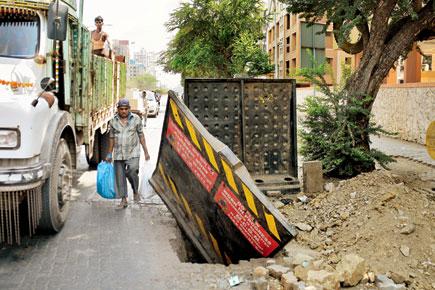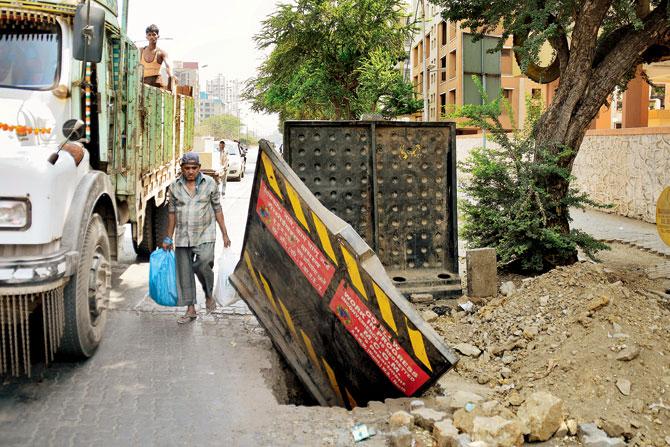On one hand, BMC spends Rs 3,000 crore to fix 600 km of roads; then grants 6,007 trenching permits to 26 utility agencies


Traffic and pedestrians weave their way around a road fence that serves to warn against a deep crater at a dug up stretch at Ashok Nagar, Borivali (West). File Pic
ADVERTISEMENT
While the Brihanmumbai Municipal Corporation (BMC) spent Rs 3,000 crore on repairing and reconstructing 600 km of city roads in the last two years, the same period saw 685 km being dug up and trenched by various utilities, according to civic data accessed by mid-day.
The BMC has a 1950-km road network in the city, meaning 35 per cent of the city’s roads was dug up for utility-related work. In 2014-15, utility agencies dug up 306 km; in 2015-16 the figure went up to 379 km. The BMC has completed repairing 1,000 roads in two years. As per the master plan of roads, in three years between 2013 and 2016, the civic body had set a target of 1239-km of roads to be repaired.
Civic officials said the haphazard digging by utilities providers is to blame for potholes and the uneven surface of even newly constructed stretches. Civic officials also said that the ad hoc digging has damaged roads excessively and the reinstatement work was largely shoddy and substandard in nature.
Telecom firms No. 1 culprit
Maximum blame, they said, fell on leading telecom companies, who have dug up 455 km of the total 685 km in their race to provide 4G connectivity.
Others agencies like the electricity board, water department, storm water department, and Mahanagar Gas have also carried out trenching in the last two years. Data available with mid-day shows the civic body gave 6,007 trenching permits to 26 utility agencies in the last two years.
The BMC in 2015 tweaked the trenching policy, asking companies and utilities to submit an annual trenching plan to the local ward officers via the road engineer (assistant engineer) by the end of July every year henceforth. While the goal was to establish better co-ordination between agencies and the road department in order to avoid damaging newly constructed stretches by trenching, very few submitted the plan. The result is that the BMC now has no clue which agency is going to dig what stretch, when.
No way of tracking
Adding to their woes, trenching data, which was electronically maintained till recently, is now maintained manually,
making it near impossible to track agencies. For haphazard digging, officials from the road department are blaming a circular that was issued in 2015 by senior officials, giving a free hand to the agencies. This coincided with a spurt in preparatory work by mobile companies to lay their cables and 4G towers.
A senior civic official from the road department said, "In 2015, a telecom giant had requested for speedy approvals for digging to lay own optical fiber cables. After this, the civic body came up with a new policy for trenching, according to which local ward officers were given powers to grant permission for trenching."
Activists have slammed the BMC for not doing enough.Activist Nikhil Desai put the blame squarely on the BMC. "This is an absolute waste of public money," said Desai. "The BMC gives permissions easily but when it comes to reinstatement, there is no mechanism
to fix a shoddy job. Civic officials don’t act, thatleads to repair of new roads, which benefits contractors."
Samajwadi party corporator Rais Shaikh agreed that it is the contractors who end up benefitting.
"Once the big telecom companies damage new roads, civic officials appoint new contractors to redo damaged patches. There should be more stringent norms to tackle trenching work since it’s the citizens who eventually suffer."
 Subscribe today by clicking the link and stay updated with the latest news!" Click here!
Subscribe today by clicking the link and stay updated with the latest news!" Click here!






